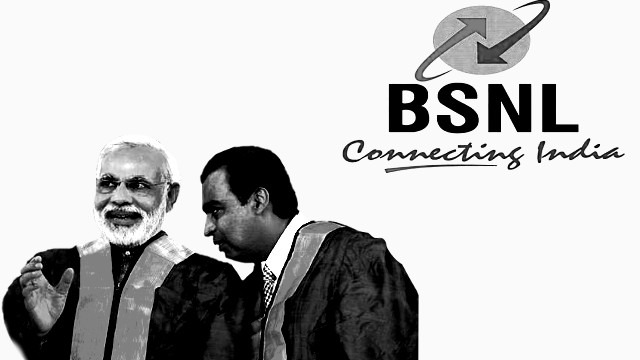
Modi Government’s Systematic Undermining of BSNL
The Bharatiya Janata Party (BJP) government under Prime Minister Narendra Modi has been accused of systematically weakening Bharat Sanchar Nigam Limited (BSNL) to benefit Reliance Jio, owned by Mukesh Ambani. Here’s a detailed look at how this alleged sabotage unfolded.
1. The 4G Tender Controversy
BSNL had floated a tender to procure equipment for its 4G network rollout. However, this tender was put on hold based on a complaint by the Telecom Equipment and Services Promotion Council (TEPC). The complaint claimed that the tender violated the “Make in India” policy by imposing conditions that favored multinational companies over local vendors.
Tender Conditions: BSNL’s tender required participating companies to have a turnover of Rs 8,000 crore and experience with 20 million 4G lines. These conditions were aimed at ensuring financial stability and technical expertise.
Government’s Response: Despite these justified conditions, the government sided with the TEPC, forming a committee to suggest new guidelines for the tender, effectively delaying BSNL’s 4G rollout.
2. Denial of Level Playing Field
While private telecom operators like Airtel and Vodafone were free to procure equipment from global giants like Nokia and Huawei, BSNL was pressured to buy from local vendors with unproven technology. This disparity denied BSNL a level playing field, hampering its ability to compete.
Impact: The forced reliance on substandard equipment further delayed BSNL’s network upgrade and expansion efforts.
3. Favoritism Towards Reliance Jio
The Modi government has been accused of favoring Reliance Jio in several ways:
Contracts and Projects: Reliance Jio was awarded major government contracts, such as providing connectivity in all Indian airports and railway services, roles traditionally held by BSNL.
Spectrum Allocation: The allocation of spectrum also favored Jio, giving it a competitive edge over BSNL.
4. Financial Strain and Reduced Advertisements
Post-2015, the government reduced BSNL’s advertisement expenditure, intentionally stifling the company’s ability to attract and retain customers. This lack of promotion contributed to BSNL’s declining market share and financial health.
Market Share Decline: From a 21% market share in 2005, BSNL’s share plummeted to a mere 10% by 2022.
Financial Losses: BSNL’s losses accumulated to INR 57,671 crore by March 2022, exacerbated by reduced tariffs during Jio’s price war.
5. National Security Double Standards
After the Galwan Valley clashes between India and China, the Department of Telecommunications (DoT) barred BSNL from procuring equipment from Chinese companies, citing national security. However, this bar did not apply to private companies, including Jio.
Contradiction: Despite national security concerns, Jio was entrusted with sensitive projects, highlighting a double standard in the government’s approach.
6. Employee Retrenchment and Unfulfilled Promises
The government’s revival package for BSNL included a voluntary retirement scheme (VRS) that led to the retrenchment of 79,000 employees. However, other promises, such as extending sovereign guarantees for raising market funds and approving bank loans, remained unfulfilled.
Result: BSNL faced an extreme liquidity crunch, further crippling its operations and growth prospects.
The Modi government’s policies and actions have systematically weakened BSNL, benefiting Reliance Jio and its owner, Mukesh Ambani. From delaying the 4G rollout to financial constraints and unfair competition, these steps have collectively pushed BSNL to the brink, raising concerns about the future of this once-vibrant public sector undertaking.
